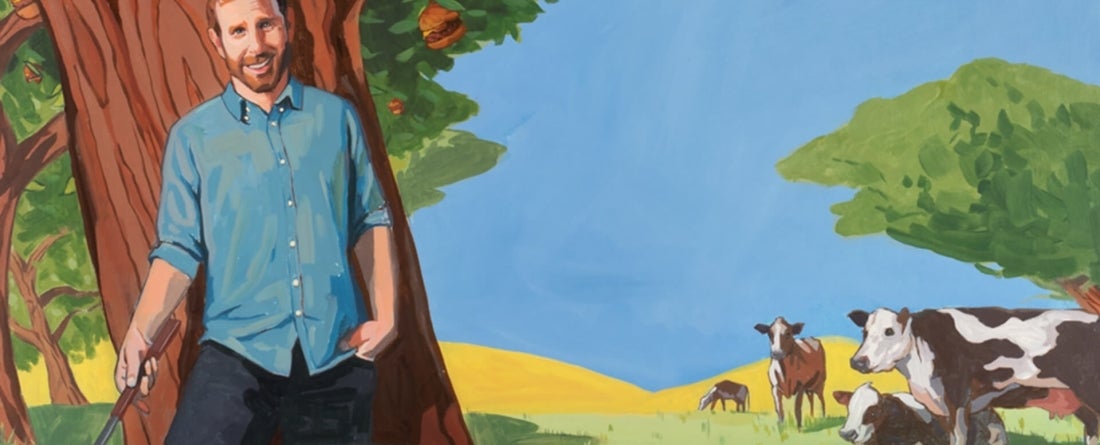
A Terp Started the Country’s Leading Plant-based Meat Company to Upend How We Eat
By Chris Carroll / Illustration by Jon Stich
That first bite into an expertly made hamburger is a sensory explosion, and a journey of sorts: It starts with the soft, subtly sweet bun, which gives way to a tangy mix of sauces followed by cool layers of fresh tomato and lettuce and crispy pickles, before you reach creamy molten cheese; and finally, the destination: the smoky char, the fatty richness, the just-plain meatiness of the beef patty that lights up pleasure centers in your brain.
Self-professed meat lover Ethan Brown M.P.M. ’97 is right there with you on this gustatory odyssey, but there’s a twist. As a vegan and the founder and CEO of Beyond Meat, which has mushroomed from a small University of Maryland-backed startup to the nation’s leading plant-based meat company, Brown is pushing for a detour: a burger that bypasses the cow.
What we’re doing, I don’t think about it as meat substitutes or meat alternatives. We’re actually building a piece of meat directly from plants.Ethan Brown MPM '97
As he tells it, animal-free meat isn’t a contradiction, and neither is being a carnivorous vegan. While millennia of history and culture have accustomed us to the fact that meat is something carved from an animal carcass, modern science (and Brown spends millions a year on research and development) is asking a new question about what the word means. What if, instead of defining meat by its origin, we simply decide that if it looks, tastes, smells and cooks like meat, then that’s what it is?
“What we’re doing, I don’t think about it as meat substitutes or meat alternatives,” Brown says in an interview with Terp. “We’re actually building a piece of meat directly from plants.”
As consumers grow increasingly concerned about livestock’s role in global warming and the health effects of eating too much animal protein, the 48-year-old Brown stands center stage in a national conversation about meat’s place in society.
Various surveys show that 30% to 50% of Americans want to reduce their meat intake, and people are snapping up Beyond Burgers and Beyond Sausage products at a skyrocketing number of retail locations and restaurants. The company reported its first quarterly profit in the fall, with revenues up 250% from a year earlier, after a wildly successful spring IPO. The 11-year-old company’s competitors are expanding their reach as well, from Impossible Foods, another scrappy startup with a Maryland connection (see below), to major meat producers like Tyson Foods and Smithfield Foods.
With an outlook and approach to business deeply influenced by his father, an environmental philosopher and a founder of the School of Public Policy, Brown sees the El Segundo, Calif.-based Beyond Meat as a mission—one aimed at improving human health, reducing the impact of animal agriculture on the environment and improving farm animal welfare—as much as a growing company. A legume-based Beyond Burger, according to a study the company commissioned in 2018 from the University of Michigan, generates 90% less greenhouse gas and has a tiny fraction of the effect on water and land use a beef burger does.
The growth of plant-based meat has generated some pushback as well, ranging from farming groups that have successfully lobbied for state laws limiting what can be marketed as meat to questions about the science behind claimed environmental or health benefits—and then there’s the “hands-off-my-cheeseburger” political commentary.
But Brown’s not about to confiscate your cheeseburger, condemn your weakness for prime rib or carry away your chili dog. A prime motivation was to give his own meat-eating children an appetizing alternative to eating animals. (Now 14 and 15, both went vegetarian several years ago.) And that’s basically his idea with Beyond Meat: Stop the eating of animals by selling diners on not just the environment and animal justice arguments, but the taste as well.
“We love meat as humans, and I think we want to keep eating it,” Brown says. “So let’s figure out a way to do it that’s good for us and good for the planet.”
